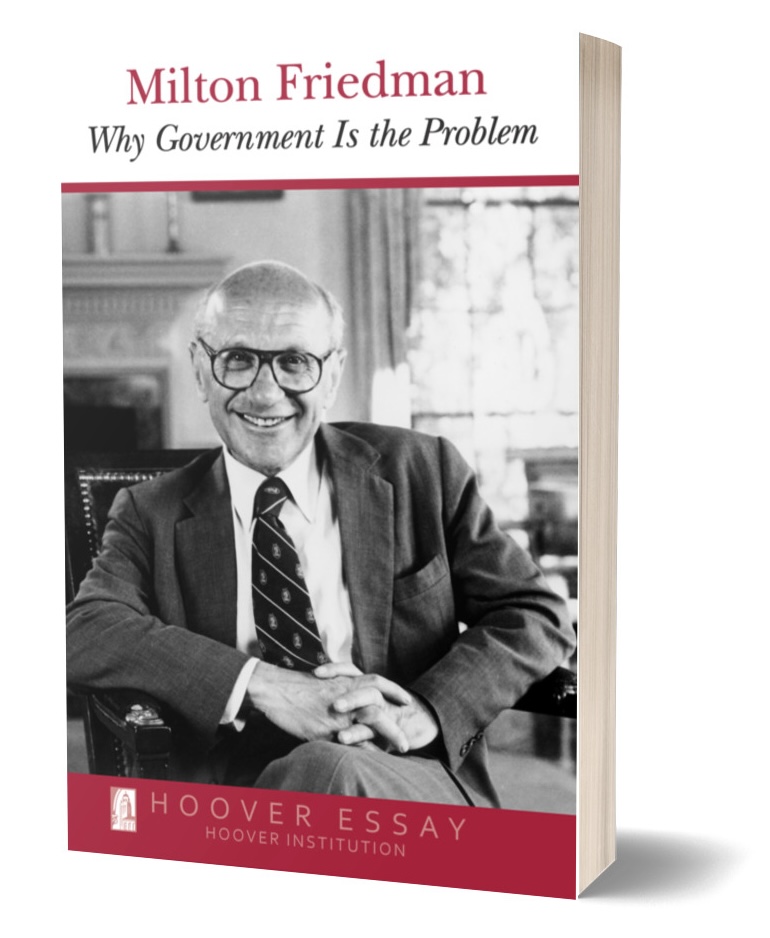Why Government Is the Problem by Milton Friedman
Summary and takeaways from the book.
Keywords:
Deep State
Informed
Capitalism
Wealth Transfer
Nov 5, 2023

"The major social problems of the United States—deteriorating education, lawlessness and crime, homelessness, the collapse of family values, the crisis in medical care—have been produced by well- intended actions of government" - Milton Friedman.
The major social problems of the United States—deteriorating education, lawlessness and crime, homelessness, the collapse of family values, the crisis in medical care—have been produced by well- intended actions of government" - Milton Friedman.

Milton Friedman is the recipient of the
Nobel Prize in Economics in 1976. He won the prize "
for his achievements in the fields of consumption analysis, monetary history and theory and for his demonstration of the complexity of stabilization policy". He was Prof. at University of Chicago and is regarded as leader of Chicago School/Field of Economics.
The short 24-page booklet "
Why Government Is the Problem" is an excellent easy-to-read explanation with examples of why and how government involvement creates problem in almost sphere of life.
The 24-page booklet is
available as a free PDF download from the Hoover Institute.
Why the government is the problem?
The Government is the problem and creates or exacerbates most social, economic and political problems such as "
education, lawlessness and crime, homelessness, the collapse of family values, the crisis in medical care".
The Government is the problem because:
Corporations use their money and lobbying to hijack the government and get special favors. The cost of this is spread among the public. COVID-19 bailouts are a recent example of this. Government works for the corporations, and the public pays for it. Milton Friedman refers to it as "
problem of concentrated benefits and diffused costs". The solution to this is to have small limited government with limited powers. Ever-larger government that offer cradle-to-grave welfare to its people usually turns against its own people as it gets hijacked by powerful and rich corporations.
The second reason why government is the problem is more fundamental as there is "
difference between the self-interest of individuals when they are engaged in the private sector and the self-interest of the same individuals when they are engaged in the government sector. "
People just work better when they are direct beneficiary of their work. This is fundamental human nature and cannot be easily 'fixed'. We just have to design systems where people can give their best taking into account the human side of the way they work.
Another reason why governments are the problem is because unlike private enterprise,
governments departments and institutions are always expanding and never shrink whether there is need for them or not. This drains taxpayer revenue and creates financial difficulty for the public. It also leads to government interfering where they are not needed to justify their existence. This explains the overreach of petty and nosy government officials who believe "Show me the man, and I will show you the crime". The solution to this as well is to have small limited government with limited powers that does not keep growing.
It is not just that the big powerful government is the problem. It is more dangerous than that. Big powerful governments are hijacked by rich corporations. The government and corporations merger involving big money, big egos, big expenses, big armies, big police force... becomes a fascist state.
What starts as a naively well-meaning benign cradle-to-grave welfare state ends up as a malignant ever-growing fascist state.
This is what we see going on in most countries in the world.
The solution to government being the problem is to have small limited government with limited powers that does not keep growing.
The author provides easy and simple examples with explanations from various sectors - "
education, lawlessness and crime, homelessness, the collapse of family values, the crisis in medical care".
A visible and easy comparison provided by the author is airlines and airports. "
The airports have been able to recruit the necessary pilots, attendants, mechanics, and so on. Where is the bottleneck? In airports, in air control facilities(and airport security). Why? Because those are run by the government."
Another example provided by the author is of the "
International Monetary Fund (IMF), which was established to administer a system of fixed exchange rates. Whether that is a good system or a bad system is beside the point. In 1971, after President Nixon closed the gold window, the fixed exchange rate system collapsed and was replaced by a system of floating exchange rates. The IMF’s function disappeared, yet, instead of being disbanded, it changed its function and expanded. It became a relief agency for backward countries and proceeded to dig deeper into the pockets of its sponsors to finance its new activities. At Bretton Woods, two agencies were established: one to administer a fixed exchange rate system and the other, the World Bank, to perform the function of promoting development. Now you have two agencies to promote development, both of them, in my opinion, doing far more harm than good."
Public awareness
"
The public at large thinks that government is too big. People know they are not getting their money’s worth for the taxes they pay. "
"
It will take a major change in the political structure, I believe, to make that possible."
Related articles
Who stole our money
Change
External Links

